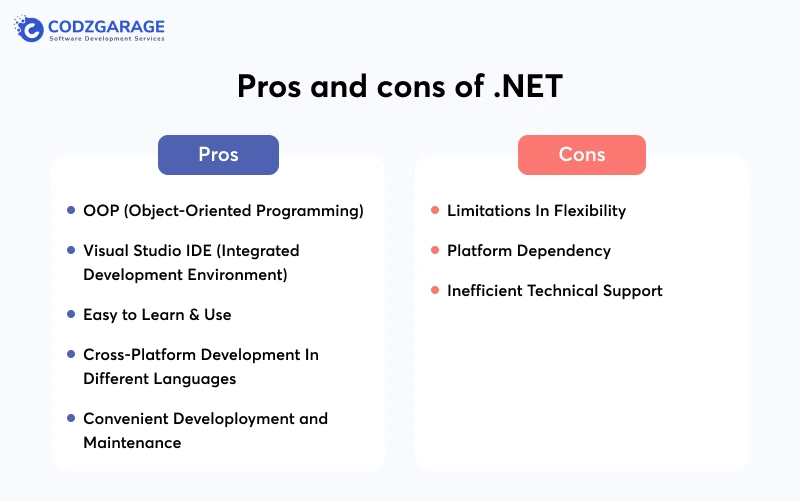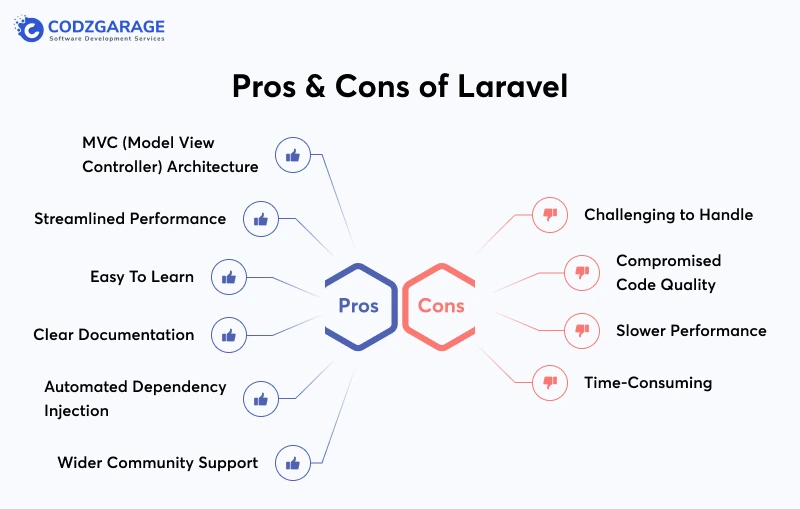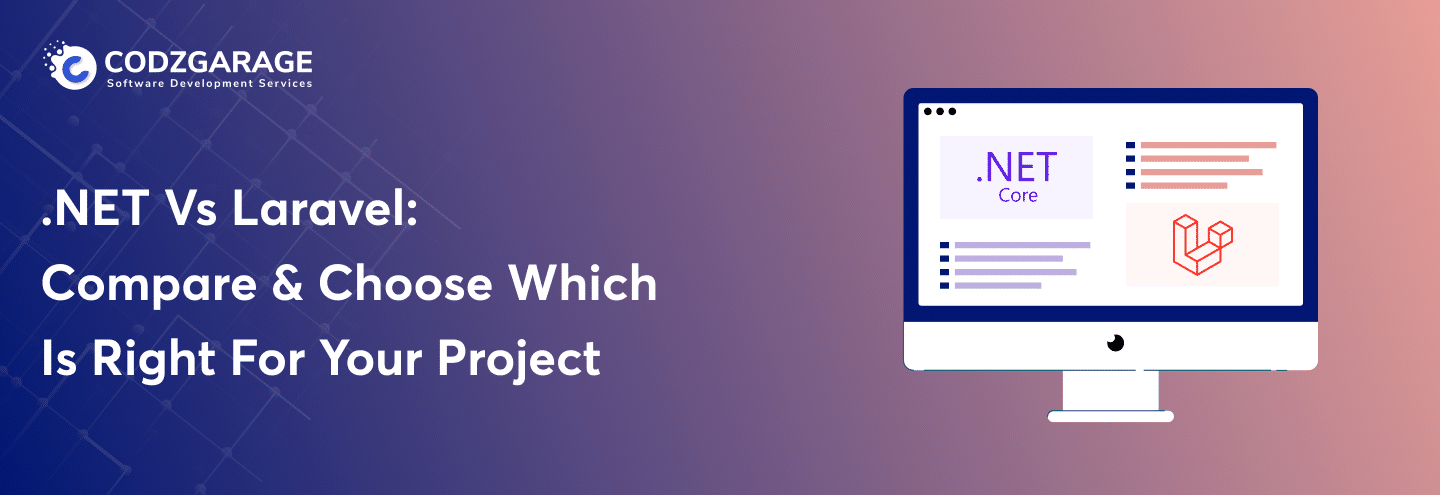.NET Vs Laravel: Compare & Choose Which Is Right For Your Project
Flip through this comparative guide (.NET Vs Laravel) and have a complete view of both technologies so that you can choose the one suitable for your web app development.
Web application development has become a popular choice among organizations—as it assists them in saving their precious time and cost while improving the overall experience. But, when it comes to choosing a tech stack, it becomes way more complex. We discussed .NET Vs PHP in our previous article, and in this segment, we’re to talk about ASP.NET Vs Laravel so that you know which one is right for your project.
Organizations tend to have a fast, sustainable, reliable, secure, and scalable web application in their firm for a flawless and seamless working experience. If you want to build an application like this, you need to focus on certain things, and one of them is choosing the right tech stack.
As the selection of technology is significant, it’s complex as well. Several technologies are available out there to build quality applications for your business, and Laravel and ASP.NET are the top ones. You just need to explore the two intensively and use them to serve your purposes.
Codzgaage is an ASP.NET Development Company providing complete software development and consulting services to organizations across the globe. Contact us for further discussion!
In this article, we have come to shed light on the Laravel Vs. ASP.NET Core differentiation to let you know which is better for your needs. This guide will take you on a tour of a comprehensive exploration of these two technologies where you don’t have a single question unanswered.
Let’s drill down!
What’s .NET?
.NET is an open-source, cross-platform developer platform created by Microsoft for creating a variety of applications. There’s a multitude of things that make .NET worth being taken into consideration. Primarily, the .NET supports various programming languages that a developer can make use of, for instance, C#, F#, and Visual Basic.
Besides, the framework is a suitable alternative for creating various applications that aren’t limited to just web development solutions. With .NET, you can create desktop and mobile applications as well while creating state-of-the-art software solutions for IoT (Internet of Things).
A majority of developers agree that using .NET for such projects is the option that lessens the development time and makes the app launch convenient while reducing the cost, too. In case you need a deeper insight into .NET, you should flip through our previous guide, “.Net Core Best Practices 2023,” for complete information.
Features of .NET
Have a look at the features of .NET!
- High Performance
- Cross-Platform
- .NET Web API
- Rich Development
- Language Dependent
- Robust Security
Pros And Cons of .NET
After knowing the basics and features, we should have a brief look at the pros and cons of the .NET. So, let’s begin with the pros of .NET!

Pros:
- OOP (Object-Oriented Programming)— It allows developers to work on the app in small, separated parts and then integrate them into a complete system.
- Visual Studio IDE (Integrated Development Environment)— It eases the proceedings of UI development.
- Easy to Learn & Use— Being easy to learn and use is one of the biggest advantages of .NET.
- Cross-Platform Development In Different Languages— You can access the necessary tech talents and create quality applications of different types with a close-to-native experience conveniently.
- Convenient Deployment & Maintenance— Because developers can focus on the object in need of changes with no need to make significant changes to the entire system, the deployment and maintenance become easy.
Cons
However, there are pluses; using .NET isn’t completely free from cons. Here are some drawbacks that you’re more likely to encounter when using .NET:
- Limitations In Flexibility— .NET lacks flexibility, which is the drawback of the OOP (Object-Oriented Programming).
- Platform Dependency— The .NET ecosystem is completely managed by Microsoft; all the projects built using its tools tend to be Microsoft-dependent, hence, aren’t possible to control except it.
- Inefficient Technical Support— .NET provides less technical support compared to Laravel.
.NET Use Cases
.NET is a versatile framework, so using it for following cases tends to make sense.
Web, Mobile, Gaming, and IoT solutions
As per the Microsoft website, there’s a variety of implementations of .NET that allow .NET to run on different environments. .NET is an excellent choice for creating Web, Mobile, Gaming applications, and IoT solutions.
Cross-Platform Development
There’s a variety of cross-platform tools in the marketplace, including React Native; however, organizations often choose .NET for cross-platform development, and that’s because the language has multiprogramming and multi-platform language compatibility.
Legacy Systems Re-Development
When it comes to Legacy System re-development, .NET is the right choice. ASP.NET integrates with legacy XML (Extensible Markup Language) systems efficiently and conveniently, which is more likely to be a trustable assistant in their re-boost.
What’s Laravel?
Laravel is an open-source web application framework written in PHP. The framework is created by Taylor Otwell and follows the model-view-controller pattern. Laravel is one of the well-known, innovative frameworks written in PHP.
Laravel provides a host of features that assist in speeding up common tasks, like routing, authentication, caching, and the like. It helps businesses spend more time creating great applications without any need to spend time on tedious details.
The framework is based on PHP, which performs with elegant and expressive syntax. It aims to make the development procedure enjoyable for developers with no need to sacrifice the quality and functionality of the software.
Features of Laravel
- Simple Authentication
- MVC Support
- Integral Security
- Secure Migration System
- Unique Unit Testing
- Object-Oriented Library & Modular
Pros & Cons of Laravel
After having a glance at the basics and features, let’s take a sneak peek at the pros and cons of Laravel. Let’s get started with the pros!

Pros
- MVC (Model View Controller) Architecture— It ensures instant and trouble-free tweaks.
- Streamlined Performance— When it comes to the fastest frameworks for web development, Laravel comes first, making it one of the popular frameworks.
- Easy To Learn— Laravel framework is easy to learn, and it has a larger developer pool.
- Clear Documentation— Laravel has clear documentation.
- Automated Dependency Injection— The automatic dependency injection ensures better performance.
- Wider Community Support— Laravel is backed by an extensive community of developers.
Cons
There are various pros of using Laravel; however, this framework, too, isn’t free from drawbacks. Following are some of the drawbacks that you should be aware of:
- Challenging to Handle— Laravel, at times, can be challenging to handle with real projects. The framework needs to set up a lot of additional tools that are more likely to be a challenge when there’s a large project.
- Compromised Code Quality— Because of customization, there’s compromised code quality in Laravel.
- Slower Performance— Updates in Laravel are tricky, and at times, they add more headaches in comparison to effectiveness.
- Time-Consuming— While there’s clear documentation, it tends to take more time to process and configure Laravel when it comes to making it work for specific projects.
Laravel Use Cases
If you want to make use of Laravel, it makes sense to use it in the following cases:
Enterprise Application Development
Since Laravel is secure, stable, and provides secure and seamless testing, it can be the right choice for enterprise-level app development.
Rapid And MVP (Minimum Viable Product) Development
Laravel ensures streamlined development; hence, it can be an ideal alternative for projects that require coming up with an MVC under strict deadlines.
eCommerce Development
Laravel is the right choice for eCommerce development. The MVC architecture and dependency injections enable developers to create high-performance websites in reduced time without sacrificing quality.
.NET Vs. Laravel: Comparison Table
Before moving to the detailed comparison of ASP.NET Vs Laravel, let’s have a brief look at the table below comparing both of the technology stacks!
| Sr. No. | Factor | .NET | Laravel |
|---|---|---|---|
| 1. | Created By | Microsoft | Taylor Otwell |
| 2. | Initial Release | June, 7, 2016 | June 2011 |
| 3. | Stable Release | v6.0.0 | 9.1.10 |
| 4. | Programming Language | F3, C#, Visual Basic | PHP |
| 5. | Technology | Platform | Framework |
| 6. | Apps Supported | Web, Mobile, and IoT Apps | Web Apps |
| 7. | Development Speed | Fast | Fast |
| 8. | Learning Curve | Seamless | Steep |
| 9. | Development Cost | Affordable | Affordable |
| 10. | License | MIT Licence | MIT Licence |
A Detailed Comparison Between ASP.NET vs. Laravel
The table mentioned above may have given you an insight into the differences and similarities between ASP.NET and Laravel; however, you need more intensive analysis to get it clear. Let’s do so on a variety of parameters, for instance, market share, performance, security, resource availability, usage, and the like! For a better understanding of .NET, you shouldn’t miss out on exploring our previous guide, ASP.NET vs. Node JS, to get it clearer.
Market Share
As per W3Tech, around 77.6% of businesses make use of PHP as their server-side programming language. Apart from that, it’s utilized by 77% of websites worldwide.

Take a sneak peek at the image below to understand the uses of both technologies broken down by their ranking.
- Around 77.6% of PHP websites are used, whereas ASP.NET is used by merely 7.7% of that.
- Of the top 100,000, 71.0% of websites make use of PHP, whereas only 14.5% use ASP.NET.
- Top 10,000, 63.6% of websites utilize PHP, whereas 16.8% use ASP.NET.
- Of the top 1000 websites, 57.6% make use of PHP, and the rest 18.9% use ASP.NET.

Performance
Your website’s performance is largely impacted by the programming language you use to develop it. But there’s nothing to be worried about– as both .NET and Laravel assist in receiving photos and files from web servers. Both ASP.NET and Laravel offer best-in-class performance and are equivalent in terms of performance.
Security
When it comes to comparing Laravel Vs ASP.NET Core, you get a different built-in security mechanism that strengthens the security. In ASP.NET, you have protection from XSS, SCRF, SQL injection, code data access security, and form-based authentication. On the other hand, when you choose Laravel, you leverage authorization, validation, hashing, password resetting, email verification, and encryption. You should bear in mind that you’re independent in choosing any of the two frameworks, and you’ll always have the choice to integrate third-party mechanisms to harden the software security.
Resource Availability
No matter whether you choose Laravel or ASP.NET, you can find developers for both easily. Note that the ASP.NET Core professionals are quite affordable compared to Laravel developers. The tools available for both of the technologies can be avail of effortlessly. When it comes to documentation, Laravel requires some improvements. Microsoft offers complete ASP.NET documentation on its official website, which covers each of the component’s implementation, functioning, troubleshooting, and the like. Hence, ASP.NET has an edge over Laravel when it comes to the availability of resources.
Usages
When it comes to uses, ASP.NET is widely used by enterprises, for instance, Alibaba, Ray Gun, GoDaddy, Cisco, and the like. The reason for that can be the robustness and the integration with Microsoft’s products. Laravel, on the other hand, has also gained popularity among companies, for instance, 9GAG, TourRadar, RazorPay, Radio, and the like, just because of its rapid development features.
Signing Off….!
That’s all there’s to it. That’s all aboutASP.NET Versus Laravel. We did a comprehensive comparison of the two technologies, and now we have come to know most of the aspects of them. However, no one can be right in every circumstance; hence, you should choose one of them as per the needs of the project.
Consider choosing .NET when you have to run a cross-platform project or you’re thinking of creating an IoT application. On the other hand, if you’ve to create a PHP website timelessly, Laravel can be the right suit. No matter whichever you choose, choose depending on the requirements of your project.
Need to hire
Hire .NET developers?Our expertise
- Decade of experience
- Quality development
- Delivery in deadlines







 Kevin Bhut
Kevin Bhut 







